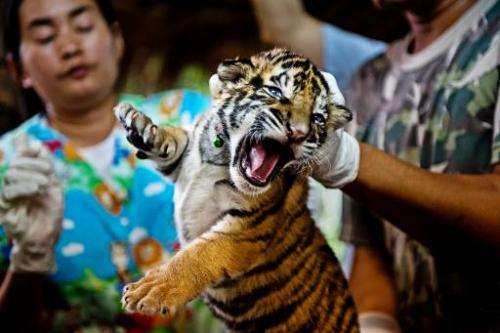Handout photo obtained on December 12, 2012 from the World Wildlife Fund (WWF) shows a veterinary team from the wildlife forensic unit taking blood samples to trace the DNA of a tiger cubs seized from smugglers on October 26, 2012 in Thailand
Thai police said Thursday they have seized five wild tiger cubs along with hundreds of other animals being smuggled to neighbouring Laos, for apparent onward sale in Vietnam or China as delicacies.
Highway officers on Wednesday stopped a pick-up truck in the northeast which was apparently headed for the Laotian border, a policeman told AFP.
A search revealed the endangered tiger cubs, all of them around a month old.
There were also hundreds of other creatures including monitor lizards and turtles, he said, adding traffickers use Thailand as a transit point to Laos and then to buyers in lucrative Asian markets.
"The final destination is either Vietnam or China where they like to eat these animals," according to Captain Pornchai Sangsila.
"The tigers will normally be kept in Laos for one year to be raised before being sold on."
Two Thai men have been charged with illegal possession of protected animals.
Television showed footage from Wednesday night of the baby tigers cradled by handlers and being bottle-fed milk.
Under international law the trade in tigers and tiger parts is strictly banned, except for non-commercial reasons such as scientific research.
Thailand is one of just 13 countries hosting fragile tiger populations—estimated at fewer than 300 in the wild—and is a hub of international smuggling.
Worldwide, tiger numbers are estimated to have fallen to only 3,200 from about 100,000 a century ago.
Wildlife experts say the kingdom is also a globally significant trade hub for turtles and tortoises and have urged authorities to do more to arrest and prosecute high-level smugglers.
© 2014 AFP
























